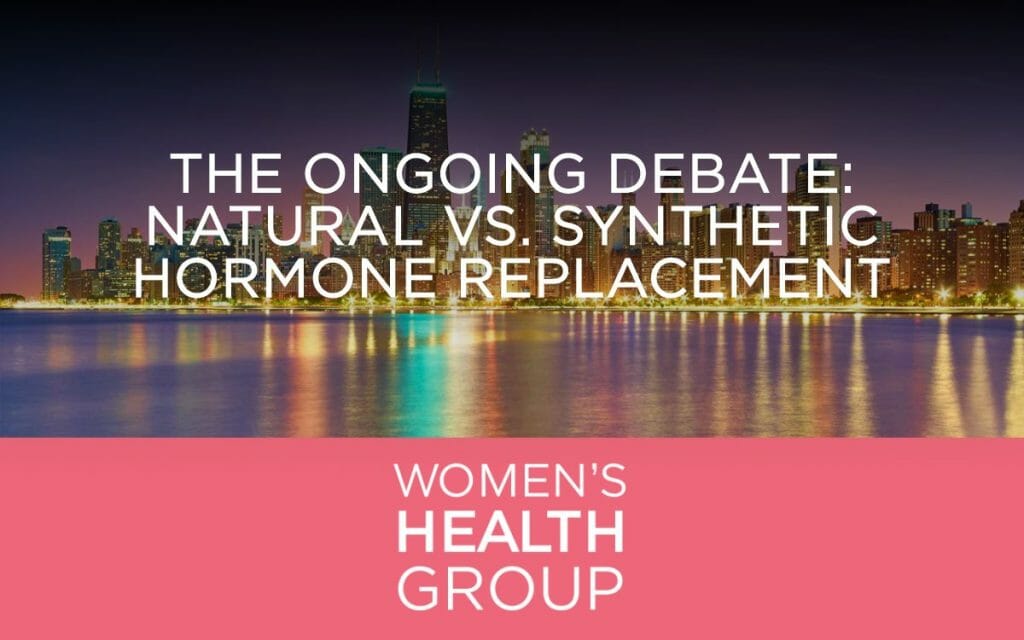Navigating the Terrain of Hormone Replacement Debate
Navigating the terrain of hormone replacement therapy (HRT) can feel overwhelming for many women. HRT involves taking hormones to compensate for those that the body may no longer produce as abundantly, particularly during the peri-menopause and menopause stages. The Hormone Replacement Debate has been waged for many years, with the focal point centered on whether synthetic or natural hormones are more beneficial and safer for women’s health. As a Women’s Health Group based in Chicago, Illinois, we have delved into this topic extensively to help our clients navigate through this complex yet crucial conversation.
Diving into the Fundamentals
To understand the debate surrounding hormone replacement therapy, it is essential to comprehend its primary function effectively. As women age, the production of hormones such as estrogen, progesterone, and testosterone naturally decline. This decline can lead to various symptoms like hot flashes, mood changes, vaginal dryness, sleep issues, and long-term bone loss. HRT can alleviate these symptoms and improve the overall quality of life.
Hormone replacement therapy involves two main types. Firstly, Synthetic Hormone Replacement, which uses synthetically produced hormones. Synthetic HRT has a track record of effectiveness but has faced criticism due to concerns about potential side effects. On the other hand, Natural Hormone Replacement relies on hormones derived from plant-based sources and are biologically identical to the hormones produced within the human body.
The Standpoint of Synthetic Hormone Replacement
Synthetic Hormone Replacement has been a prevalent approach for many years. The advantage of synthetically produced hormones lies in their effectiveness and often, the affordable cost associated with them. They have been proven to effectively mitigate the symptoms that come along with menopause and, in some cases, prevent long-term health issues such as osteoporosis.
However, it’s crucial to understand that like any other medical treatment, synthetic hormone replacement therapy comes with potential risks. The Mayo Clinic points out that synthetic hormones have been linked to an increased risk of heart disease, stroke, blood clots, and breast cancer in some women. The risk tends to vary based on the individual’s health history, the type of hormone used, and the duration of therapy.
Natural Hormone Replacement: A Safer Alternative?
Natural Hormone Replacement Therapy (NHRT), also known as Bioidentical Hormone Replacement Therapy (BHRT), is increasingly favored as an alternative to synthetic hormones. These hormones are derived from plant sources such as soy or wild yam and are designed to be chemically identical to those your body produces naturally.
There is a widely held belief that because natural hormones mimic the body’s hormones, they are safer and present fewer side effects than synthetic counterparts. Proponents of natural hormone therapy assert that it offers the benefits of synthetic HRT without some of the same risks.
However, it is to be noted that while the use of natural hormones is growing, the fact remains that all hormone replacement therapy, regardless of its source, carries some degree of risk and potential side effects. The Office on Women’s Health points out that despite some potential benefits of NHRT in managing menopausal symptoms, long-term data on safety, efficacy, and ultimate health outcomes are still lacking.
Finding the Right Approach
In deciding the best approach to hormone replacement therapy – whether that be synthetic or natural – it is vital to understand that each woman’s needs are individual. The best therapy is always the one that optimizes your health and quality of life.
In fostering a dialogue about HRT, we must ensure an understanding of the potential benefits and risks with each approach. Most importantly, the decision must reflect the individual’s needs, health history, and personal comfort with the treatment. Your healthcare provider can help you weigh the pros and cons of each option and choose a therapy that aligns with your needs and objectives.
Final Takeaways
The Hormone Replacement Debate, focused on comparing natural and synthetic therapies, reflects a broader conversation concerning women’s health and the complexity of individualized care. As the field of women’s health continues to evolve and as we continue to gain knowledge about different hormonal therapies, it is critical to foster open, detailed discussions about various treatment options available.
Hence, while the debate rages on, it’s important to remember that there is no one-size-fits-all approach when it comes to women’s health. The optimal hormone replacement therapy will vary widely based on personal factors. Always consult your healthcare provider to help navigate these options in order to find a strategy that ensures the best results for your health and lifestyle.




